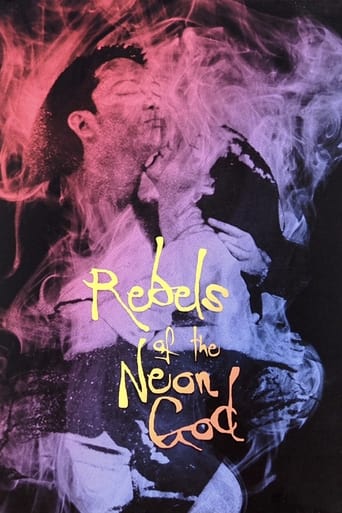akash_sebastian
Acclaimed director Tsai Ming-liang's directorial debut is a fascinating and intriguing story about the rebellious nature of youth, and the emptiness and meaninglessness felt by them. It's also the first of many collaborations between the director and actor Lee Kang-sheng.Water, water everywhere. Just with regular places like malls, arcades, hotel rooms and houses, Tsai creates a recognizable urban environment, where the rebellious actions of few individuals form a complete cycle. From the James Dean poster to the mention of reincarnation of a rebellious God, and even the Mandarin and English titles of the film, the movie doesn't shy away from telling what it's about. And in its subtle way, it also tries to explore the reasons behind it. Like the cram school one of the protagonists (Hsiao Kang) is sent to, cities are crammed with people in the same way, but despite that, people feel more disconnected than ever. From the phone dating thing service in the story to our present-day social networking sites, the story tries to emphasize that with urbanization, humans have lost touch with direct interactions and brotherhood.The bleak tone may put some people off, but it actually adds to the tone of the story. Tsai here gives us a slice of these young lives, and asks us to contemplate on 'Why do we do the things we do?' All the actors are cast well, and they do a commendable job.NOTE: It's preferable if one watches Tsai Ming-liang's films in order because the character Hsiao-kang (Lee Kang-sheng) appears in most of his films, this being the first. The order might help in exploring and understanding the character much better.
Arne Reisegg Myklestad
On a more obvious level of multiple layers, a crucial, cultural point of significance seems lost in translation. As Rebels of the neon god comprise the sense of urban alienation, tradition and cultural adaptation, secularization, the decaying city and loss of identity, the original title translates literally Teenage Nezha. And as implied by his frustrated mother, the main character of Hsiao Kang bares resembling "qualities" to that of the rebel god, born into a human family and in constant opposition. While most reincarnations of Nezha grow additional limbs for the purpose of eradicating their father, Hsiao's idle hands become the playground for the prankster god. Sparked by an act of force, the two main plots of the film intertwine, and are further fueled by the returning violence. After their encounter in the arcade, Hsiao can be seen playing the same shoot-em-up as the one Ah Tze played while sitting next to him, symbolizing a change in character and the unraveling of the revenge. The directors returning use of water as ever-present, controlling element of nature, suppressing spaces of confined and human, primal behavior sets up a hierarchy of command in the metropolitan chaos of Taipei.
cwx
In his first film, international "arty" director Tsai Ming-liang tells what is apparently, for him, a fairly accessible tale about two fake thugs, the sometimes-girlfriend of one of them, and a younger teenager who has a strange preoccupation with the three of them. He does so largely with long, one-take, unmoving shots (when the action moves into the background, the camera usually doesn't follow). It's not always easy to understand the relationship between these various characters, which is just as well, as it is pretty languid and obscure in general; teasing out the nuances of these relationships was my main source of interest while watching this film. Overall, it seems to be worth a try, but not worth a recommendation. I got a generally positive impression from it (meaning that it didn't just totally irritate me), but it didn't provoke a strong visceral aesthetic appreciation (that's a little paradoxical I guess) that I get from my favorite "art films." I'm tempted to watch one of Tsai's later, "better-known" (relatively speaking) films, but I'm not sure that I'm that enamored with his visual style or his style of storytelling (as opposed to, say, that of Wong Kar-Wai).
xuck
Anyone who has ever visited Taipei would agree that this movie is so real by picturing out the decadent city. The city is getting more terrible with people who deeply believe in fake democracy but ignore their environmental improving. Our young heroes are victims like all the living victims one will easily find in streets of Taipei.



